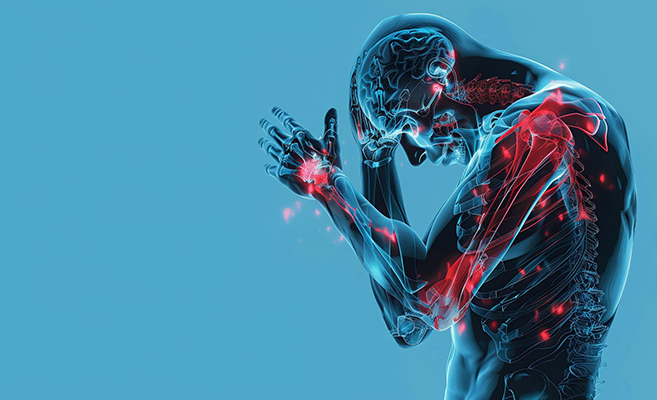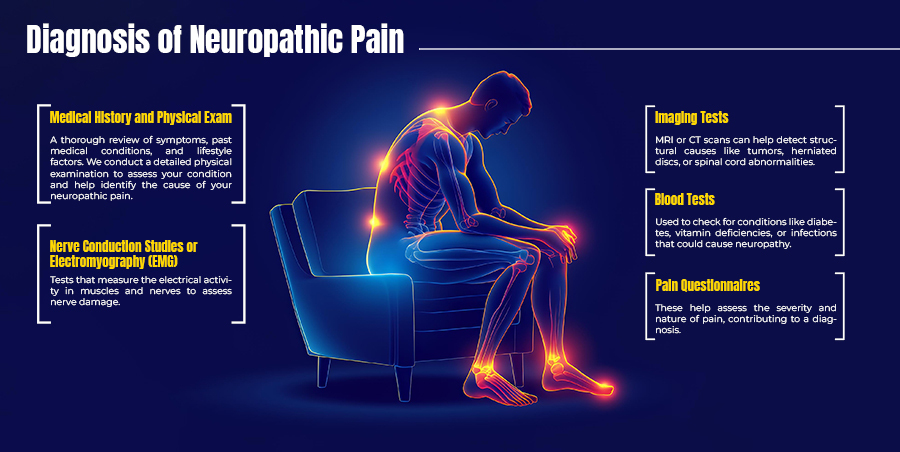Neuropathic Pain (Nerve Pain): Causes, Symptoms & Treatment

Living with nerve pain can be overwhelming. Unlike other types of pain, neuropathic pain is caused by nerve damage itself, not by injury or inflammation in tissues. It can be chronic and persistent, severely affecting your quality of life. It often feels like a burning, stabbing, or tingling sensation that disrupts your daily activities. If you are experiencing nerve pain, understanding its causes and symptoms is the first step toward finding relief.
At PSRI Hospital, the best hospital in Delhi, we specialize in treating nerve pain with personalized care. Our team of expert neuro spine surgeons in Delhi provides advanced treatments, ensuring you receive the best care possible to manage and reduce your nerve pain effectively. Our patient-centered approach is designed to offer relief and improve your quality of life.
Continue reading to explore the nerve pain causes, symptoms, and treatment options for nerve pain, and learn how PSRI Hospital can help you manage your condition and get back to feeling your best.
Causes of Neuropathic Pain
The common causes of neuropathic pain and the underlying factors that may contribute to your condition are:
- Diabetes (Diabetic Neuropathy): One of the most common nerve pain causes, particularly in people with poorly controlled blood sugar levels. High blood sugar can damage nerves over time.
- Shingles (Postherpetic Neuralgia): A viral infection caused by the reactivation of the chickenpox virus (varicella-zoster), leading to nerve damage and pain.
- Trauma or Injury: Physical injury to nerves, such as a car accident, surgery, or amputation (e.g., phantom limb pain), can lead to nerve damage and neuropathic pain.
- Multiple Sclerosis (MS): An autoimmune disease that attacks the protective covering of nerves (myelin), leading to nerve damage and pain.
- Alcohol Abuse: Chronic alcohol consumption can lead to a form of neuropathy known as alcoholic neuropathy, causing nerve damage and pain.
- Chemotherapy (Chemotherapy-induced Peripheral Neuropathy): Certain cancer treatments can damage peripheral nerves and cause painful sensations in the limbs.
- Infections: Conditions like HIV/AIDS, Lyme disease, or leprosy can result in nerve damage and neuropathic pain.
- Vitamin Deficiency: Lack of certain vitamins, especially B vitamins (e.g., B12), can lead to nerve damage and pain.
- Spinal Disorders: Conditions like herniated discs, spinal stenosis, or degenerative disc disease can compress nerves in the spine, leading to neuropathic pain.
- Stroke or Brain Injury: Nerve damage that occurs in the brain or spinal cord following a stroke or brain injury can result in neuropathic pain.
- Inherited Conditions: Some genetic disorders like hereditary neuropathies cause nerve damage and subsequent pain.

Symptoms of Neuropathic Pain
Neuropathic pain can occur in different forms, and the intensity and area affected may vary depending on the cause. These nerve pain symptoms can differ from person to person but typically include:
- Burning Sensation: A persistent, often intense feeling of burning pain in the affected area.
- Sharp or Stabbing Pain: Sudden, jabbing pain that can feel like an electric shock.
- Tingling or “Pins and Needles”: A sensation of numbness or tingling (paresthesia) in the affected region.
- Sensitivity to Touch (Allodynia): Pain caused by normally non-painful stimuli, such as light touch, pressure, or even clothing.
- Numbness: A loss of sensation or feeling in the affected area.
- Weakness: Muscle weakness can occur if the nerve damage affects motor functions.
- Electric Shock Sensations: Some people experience electric shock-like pain or sensations in the limbs.
- Persistent Pain: The pain may be constant, or it may occur in episodes, and often worsens at night.
Treatment for Neuropathic Pain
Managing neuropathic pain often requires a multi-faceted approach. Here are common nerve pain treatment options:
1. Medications:
- Antidepressants: Certain antidepressants (e.g., amitriptyline, duloxetine) can help relieve neuropathic pain by altering chemical signals in the brain and spinal cord.
- Anticonvulsants: Medications like gabapentin and pregabalin are often used to treat nerve pain by calming overactive nerves.
- Topical Treatments: Creams, patches, or gels containing lidocaine or capsaicin can provide localized relief by numbing the area or reducing sensitivity.
- Opioids: In severe cases, opioids may be prescribed, but due to the risk of dependency, they are generally used as a last resort.
- Pain Relievers: Over-the-counter medications like ibuprofen or acetaminophen can help with mild nerve pain, though they are often ineffective for severe neuropathy.
- Corticosteroids: In cases where inflammation is a significant contributor to nerve pain (e.g., herniated disc), corticosteroids may reduce inflammation and pain.
2. Physical Therapy:
Physical therapy can help improve muscle strength, joint flexibility, and mobility, particularly in cases where nerve pain leads to weakness or limited movement. Techniques like transcutaneous electrical nerve stimulation (TENS) may also be used.
3. Psychological Counseling:
Chronic pain often affects mental health. Cognitive-behavioral therapy (CBT) and other forms of counseling can help individuals cope with the psychological impact of neuropathic pain.
4. Nerve Blocks or Injections:
For localized pain, injections of local anesthetics or corticosteroids into the area near the affected nerve can provide temporary relief. In more complex cases, nerve blocks (injection of an anesthetic around specific nerves) may be an option.
5. Surgical Options:
If neuropathic pain is caused by nerve compression or structural issues, surgery may be necessary to remove the cause (e.g., herniated disc, tumor).
6. Lifestyle Modifications:
Managing conditions like diabetes, quitting smoking, reducing alcohol consumption, and eating a healthy diet can prevent or reduce neuropathic pain. Stress management techniques, including relaxation exercises and mindfulness, can also be beneficial.
Conclusion
At PSRI Hospital, we understand the challenges that come with managing neuropathic pain. With our expert team, best neuro spine doctor in Delhi and advanced treatment options, we are committed to providing the best care tailored to your needs. Whether through medication, physical therapy, or specialized procedures, our goal is to help you find relief and regain control of your life.
If you are struggling with nerve pain, don’t wait any longer. Reach out to PSRI Hospital today to schedule a consultation and take the first step towards a pain-free life.
FAQ’s
Q1. What lifestyle changes can help manage nerve pain?
Ans. Maintaining a healthy diet, quitting smoking, reducing alcohol intake, and regular exercise can improve nerve health and help manage nerve pain effectively. Stress management and relaxation techniques also play a key role in reducing symptoms.
Q2. Can nerve pain be completely cured?
Ans. While nerve pain may not always be fully cured, it can be managed with appropriate nerve pain treatment. Early intervention and tailored care often provide significant relief, allowing individuals to lead a more comfortable life.
Q3. How long does it take to see improvement in nerve pain?
Ans. Improvement in nerve pain symptoms varies per individual. With proper treatment, many patients start noticing relief within weeks, though it may take longer for others depending on the cause and severity of the condition.
Q4. What is the role of physical therapy in treating nerve pain?
Ans. Physical therapy helps improve strength and mobility, easing nerve pain by restoring function. Techniques like TENS (Transcutaneous Electrical Nerve Stimulation) are commonly used to provide relief from nerve pain symptoms.
Q5. Are there risks in using opioids for nerve pain?
Ans. Opioids may be effective for severe nerve pain, but they come with risks of dependency. They are typically used only when other nerve pain treatments are ineffective, under strict medical supervision.

 Book An Appointment
Book An Appointment Virtual Consultation
Virtual Consultation





